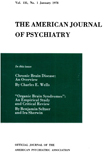A Follow-Up Study of Intensively Treated Chronic Schizophrenic Patients
Abstract
Two groups of chronic schizophrenic patients were treated with intensive psychotherapy for a period of two years, starting in 1962 and 1964. Half of the patients also took phenothiazines. Control groups at a local state hospital received phenothiazines but no psychotherapy. A follow-up of the groups on three tests of adjustment, administered at the end of 1967, indicated some trends toward better adjustment by patients who had received psychotherapy but there were no statistically significant differences among the groups.
Access content
To read the fulltext, please use one of the options below to sign in or purchase access.- Personal login
- Institutional Login
- Sign in via OpenAthens
- Register for access
-
Please login/register if you wish to pair your device and check access availability.
Not a subscriber?
PsychiatryOnline subscription options offer access to the DSM-5 library, books, journals, CME, and patient resources. This all-in-one virtual library provides psychiatrists and mental health professionals with key resources for diagnosis, treatment, research, and professional development.
Need more help? PsychiatryOnline Customer Service may be reached by emailing [email protected] or by calling 800-368-5777 (in the U.S.) or 703-907-7322 (outside the U.S.).



